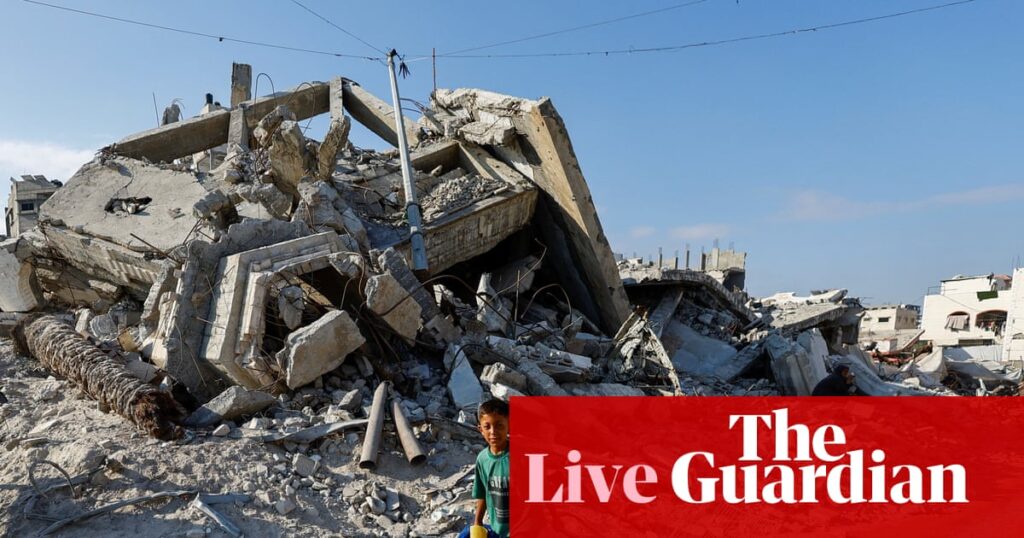Gaza civil defence agency says 20 killed by overturned aid truck
Gaza’s civil defence agency said on Wednesday that 20 people were killed when an aid truck overturned near the Nuseirat refugee camp in the central Gaza Strip.
“Twenty people were killed and dozens injured around midnight last night in a truck carrying aid [that] overturned … while hundreds of civilians were waiting for aid,” the agency’s spokesperson Mahmud Bassal told Agence France-Presse (AFP).
Hamas accused Israel of forcing truck drivers to take unsafe routes to reach aid distribution centres. “This often results in desperate crowds swarming the trucks,” its media office said in a statement.
Seperately, it was reported yesterday that truck drivers trying to deliver aid inside Gaza said their work had become increasingly dangerous in recent months as people have grown desperately hungry and violent gangs have filled a power vacuum left by the territory’s Hamas rulers.
Crowds of hungry people have routinely ripped aid off the backs of moving trucks, the local drivers said. According to reports, some trucks have been hijacked by armed men working for gangs who sell the aid in Gaza’s markets for exorbitant prices.
In other developments:
-
An Israeli security cabinet meeting, which had been expected to discuss Benjamin Netanyahu’s call for the “full occupation” of Gaza, has been postponed amid mounting tensions over whether the plan is feasible. Amid a stalling of ceasefire negotiations with Hamas, Israeli officials had briefed local and international media that the prime minister was considering an expansive offensive, aimed at taking full control of the Palestinian territory after 22 months of war against the militant group Hamas.
-
On Tuesday, the United Nations called reports about a possible decision to expand Israel’s military operations throughout the Gaza Strip “deeply alarming” if true. The UN assistant secretary general Miroslav Jenča told a UN security council meeting on the situation in Gaza that such a move “would risk catastrophic consequences … and could further endanger the lives of the remaining hostages in Gaza”.
-
The US president, Donald Trump, declined to say whether he supported or opposed a potential military takeover of Gaza by Israel and said his administration’s focus was on increasing food access to the Palestinian territory under assault from Washington’s ally. “I know that we are there now trying to get people fed,” Trump told reporters on Tuesday. “As far as the rest of it, I really can’t say. That’s going to be pretty much up to Israel.” Trump said Israel and Arab states were going to help with food and aid distribution in Gaza and provide financial assistance. He did not elaborate.
-
The leader of Lebanon’s Hezbollah warned on Tuesday that if Israel intensified its military operations against his group, the Iran-backed armed faction would resume firing missiles toward Israel. Naim Qassem’s comments came as Lebanon’s cabinet was meeting to discuss Hezbollah’s disarmament.
-
Gaza’s civil defence agency said 26 people were killed by Israeli gunfire and airstrikes on Tuesday, including 14 who were waiting near an aid distribution site. Civil defence spokesperson Mahmud Bassal told AFP that eight people were killed by Israeli gunfire while waiting for aid near the southern city of Khan Younis.
Key events

Harry Davies
One afternoon in late 2021, Microsoft’s chief executive, Satya Nadella, met with the commander of Israel’s military surveillance agency, Unit 8200. On the spy chief’s agenda: moving vast amounts of top secret intelligence material into the US company’s cloud.
Meeting at Microsoft’s headquarters near Seattle, a former chicken farm turned hi-tech campus, the spymaster, Yossi Sariel, won Nadella’s support for a plan that would grant Unit 8200 access to a customised and segregated area within Microsoft’s Azure cloud platform.
Armed with Azure’s near-limitless storage capacity, Unit 8200 began building a powerful new mass surveillance tool: a sweeping and intrusive system that collects and stores recordings of millions of mobile phone calls made each day by Palestinians in Gaza and the West Bank.
Revealed here for the first time in an investigation by the Guardian with the Israeli-Palestinian publication +972 Magazine and Hebrew-language outlet Local Call, the cloud-based system – which first became operational in 2022 – enables Unit 8200 to store a giant trove of calls daily for extended periods of time.
Microsoft claims Nadella was unaware of what kind of data Unit 8200 planned to store in Azure. But a cache of leaked Microsoft documents and interviews with 11 sources from the company and Israeli military intelligence reveals how Azure has been used by Unit 8200 to store this expansive archive of everyday Palestinian communications.
According to three Unit 8200 sources, the cloud-based storage platform has facilitated the preparation of deadly airstrikes and has shaped military operations in Gaza and the West Bank.
Thanks to the control it exerts over Palestinian telecommunications infrastructure, Israel has long intercepted phone calls in the occupied territories. But the indiscriminate new system allows intelligence officers to play back the content of cellular calls made by Palestinians, capturing the conversations of a much larger pool of ordinary civilians.

Geneva Abdul
The son of a British woman being held in Iran on espionage charges has said speaking to her on the phone for the first time in 213 days felt like “five birthdays and 10 Christmases at once”.
Lindsay and Craig Foreman, both 52, were arrested on 3 January in Kerman, southern Iran, while travelling through the country from Armenia to Pakistan on a round-the-world motorbike trip.
Their family had not had direct contact with the couple since their incarceration seven months ago until Tuesday, when they were able to speak for the first time. They were also informed the couple had been transferred to separate Iranian prisons in and near Tehran.
“To hear your mum’s voice after so long, your rock, your guide, someone you’ve missed more than you can even express, it’s like five birthdays and 10 Christmases all at once,” said Lindsay’s son, Joe Bennett.
While the family said the phone calls provided joy and relief, they continue to urge the government to secure the couple’s release. The couple have received calls from British embassy officials, but their family said they should be allowed to receive consular and medical visits.
The family learned on Monday that Lindsay had been transferred to Qarchak women’s prison, south of Tehran. Human rights groups have repeatedly criticised the dire conditions reported there.
Netanyahu to convene security cabinet tomorrow evening – report
Israeli prime minister Benjamin Netanyahu will convene his security cabinet at 6pm, local time, on Thursday at his office in Jerusalem, reports the Times of Israel.
According to the Israeli online newspaper, the cabinet is reportedly set to approve a full military occupation of the Gaza Strip during tomorrow’s meeting, despite the country’s chief of staff, Eyal Zamir and army officials warning against the move.
The Guardian has been unable to independently verify the report.
Humanitarian agencies are warning that hunger is spreading rapidly across the Gaza Strip and a famine is unfolding. Aid has been trickling into Gaza via trucks and coordinated humanitarian airdrops over the territory, after international pressure over severe shortages of food and medical supplies.
Footage from the ground shows injured Palestinians crowding at hospitals after Israeli fire injured dozens of people at an aid distribution site. Aid sites have become increasingly dangerous in recent months after a series of Israeli attacks in the form of airstrikes and gunfire. Crowds of hungry people have routinely ripped aid off the backs of moving trucks, local drivers say.

Ben Quinn
Protesters calling for the ban on Palestine Action to be lifted are planning to stage a demonstration in London on Saturday that could result in hundreds being arrested.
The mass action is in support of a campaign to overturn the proscription of the group, which was banned under terrorism laws on 5 July.
Organisers are asking participants to hold up placards saying: “I oppose genocide. I support Palestine Action.”
The Metropolitan police have warned that anyone showing support for Palestine Action will be arrested.
The Israeli military has told the news agency Agence France-Presse (AFP) that it is looking into the reports that 20 people were killed when an aid truck overturned on a crowd of aid seekers in the central Gaza Strip (see 8.03am BST).
Here are some images coming in via the newswires today:
Lebanon has decided to rebaptise a road named after the former Syrian president Hafez al-Assad in favour of the late Lebanese musician and playwright Ziad Rahbani, a move many welcomed on Wednesday, reports Agence France-Presse (AFP).
“Hafez al-Assad into the dustbin of history, Ziad Rahbani is the name of the airport road for ever!” the independent lawmaker Mark Daou, who opposes Hezbollah, wrote on X.
On Tuesday, the government announced the new name for the thoroughfare, which runs to the international airport through south Beirut, where Hezbollah enjoys strong support, reports AFP.
The Lebanese actor Ziad Itani welcomed the move, telling AFP that the former Syrian leader was associated with “dark periods in Lebanese history, marked by massacres, abuses and assassinations”.
A member of Hezbollah was killed in an Israeli drone strike in Lebanon’s north-eastern Bekaa valley on Tuesday night, the Times of Israel reports, citing the Israel Defense Forces (IDF).
“The terrorist’s activity posed a threat to the State of Israel and its citizens,” the IDF said, describing Hassam Qassem Gharab as directing, from Lebanon, “terror cells in Syria to launch rockets at the Golan Heights in northern Israel”.
Even as global attention has turned to starvation in Gaza, where after 22 months of a devastating Israeli military campaign a global hunger monitor says a famine scenario is unfolding, the water crisis is just as severe according to aid groups, reports Reuters.
Though some water comes from small desalination units run by aid agencies, most is drawn from wells in a brackish aquifer that has been further polluted by sewage and chemicals seeping through the rubble, spreading diarrhoea and hepatitis.
Cogat, the Israeli military agency responsible for coordinating aid in the Israeli-occupied Palestinian territories, says it operates two water pipelines into the Gaza Strip providing millions of litres of water a day. Palestinian water officials say these have not been working recently, reports Reuters.
Israel stopped all water and electricity supply to Gaza early in the war, later partly resuming it, though the pipeline network in the territory has been badly damaged.
Most water and sanitation infrastructure has been destroyed and pumps from the aquifer often rely on electricity from small generators – for which fuel is rarely available.
According to Reuters, Cogat said the Israeli military has allowed coordination with aid organisations to bring in equipment to maintain water infrastructure throughout the conflict.
The United Nations says the minimum emergency level of water consumption per person is 15 litres a day for drinking, cooking, cleaning and washing. Average daily consumption in Israel is about 247 litres a day according to Israeli rights group B’Tselem.
Bushra Khalidi, the humanitarian policy lead for the aid agency Oxfam in the Israeli-occupied Palestinian territories said the average consumption in Gaza now was 3-5 litres a day.
Oxfam said last week that preventable and treatable water-borne diseases were “ripping through Gaza”, with reported rates increasing by almost 150% over the past three months.


